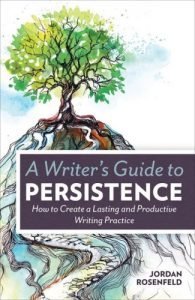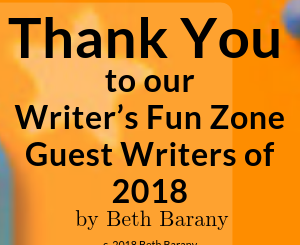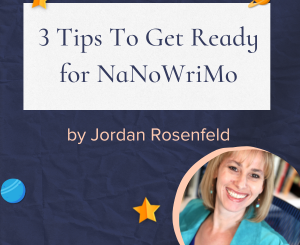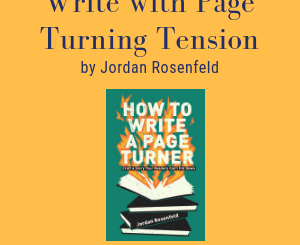 Today we welcome a new guest writer to Writer’s Fun Zone, journalist, editor, and writing coach and teacher, Jordan Rosenfeld, who is stopping by to chat with us today about “Staying Persistent on the Tumultuous Road to Publication.”
Today we welcome a new guest writer to Writer’s Fun Zone, journalist, editor, and writing coach and teacher, Jordan Rosenfeld, who is stopping by to chat with us today about “Staying Persistent on the Tumultuous Road to Publication.”
Editor’s note: I was honored to hear Jordan’s speech live at the Annual Conference on Creative Writing in Stockton, CA last weekend. Jordan is also on my list of Recommended Partners.
Enjoy!
***
Staying Persistent
On Friday June 22nd, I gave a keynote speech at the University of the Pacific’s Creative Writer’s Conference.
Here is that talk:
Although I stand here today as a multi-published author of books, articles and essays, I want to start off this talk by telling you a few things about myself that you may not know: when I sold my first book, Make a Scene, to Writers Digest Books over a decade ago, one of my close friends from graduate school pointedly asked me: Why you?
Before you assume she was a bad friend, let me explain what she meant. Why me? I was not a household name. I had never published a book before. I hadn’t even finished my Masters program at the time and had no platform other than some local literary projects.
I wasn’t offended by her question because I had the same one.
Looking back on it now, I can see that what I had was a good idea, the courage to put myself out there, and a stubborn resistance to the idea that only the famous can succeed.
This theme of throwing myself into things despite a lack of credentials has informed almost every success I can call my own. Today I work as a full-time freelance journalist yet I do not have a journalism degree. I mean, I was an editor on the high school newspaper for two years but my three-quarters of a communications degree does not quite count.
I have been represented by two literary agents, who did not sell either of the novels they represented. Every book I’ve published I have sold directly to the publisher myself. What I lack in experience, credentials or platform I have made up for with one equally important trait: persistence.
Persistence means getting up and writing even when you think you have nothing to say. It means understanding that rejection is just a sign that you’re walking the writing path. It means saying yes to weird opportunities that grow your craft or help you network. It means volunteering your time when it will teach you something you need to learn.
Or as the great sci-fi writer Octavia Butler put it:
First forget inspiration. Habit is more dependable. Habit will sustain you whether you’re inspired or not. Habit will help you finish and polish your stories. Inspiration won’t. Habit is persistence in practice.
Writing Practice
Persistence also means that you cultivate a writing practice—that is you take an expansive view of the writing life that incorporates everything you do, not just the writing itself, and not just the successes and wins. I like the word practice more than career. A practice is continuous, spacious, open ended and ongoing.
Try to cultivate a writing practice with the same grace that yogis do a yoga practice. Do you think a yogi gets up in the morning with the goal to get in a certain number of poses or to compete with a fellow yogi or be an overnight yogi success? No, it’s a way to take care of one’s mind and body and a way of life.
So is a writing practice—it is the sum total of all the things you do toward, for and with your writing.
This means that the time you spend in the shower thinking about plot points counts as part of your writing practice, as does that newsletter you do for your child’s school for free; as does research and reading other books, and the hours you spend wrestling with a chapter or a scene that just won’t gel.
On that note, all the writing you do counts.
As author Brenda Ueland says in her wise book If You Want to Write:
No writing is a waste of time—no creative work where the feelings, the imagination, the intelligence must work. With every sentence you write, you have learned something. It has done you good. It has stretched your understanding.
Instant gratification culture
Part of the reason it’s so easy to get discouraged as a writer is that we live in an culture of instant gratification, made more increasingly so by digital technology and streaming entertainment. I’m not particularly old but I am old enough to remember life before the Internet.
I didn’t get my first email account until college, and at that point you could only email other students. I didn’t have a personal computer until my 20s, and it was about the size of a small refrigerator. And social media was a term that meant friendly reporters.
This is to say, I came of age as a writer when books were paper objects; but now we writers compete with tiny supercomputers, offering portals to all the information in the world, literally in people’s back pockets.
When you can get anything on demand, from your groceries to your favorite TV shows to the latest e-book, it’s easy to be swept up in the feeling that we should be able to produce writing this quickly as well.
And, after we produce it, naturally we should be able to publish it to instant acclaim, right?
Well, unfortunately, or maybe fortunately, great art and good entertainment take time to create. They take time to find their way to the right audiences. Along the way, however, we can face a variety of complicated emotions such as discouragement, despair and impatience.
When I feel frustrated that I can’t write a novel in thirty days during National Novel Writing Month, or even just struggle to find a strong lede to an article, I remind myself that once upon a time, a slow, steady apprenticeship was the way artists became good at what they do.
This reminds me of an interview I did with a painter for a local magazine years ago. I asked her how long it took her to finish one of her numerous large acrylic paintings.
Her answer was, “For every finished painting you see, I paint miles and miles of canvas.” That phrase has stuck with me ever since as a metaphor for the creative process. Maybe, for us writers, we have to write libraries of words for every finished piece.
Writing is a long game that we undertake in small bursts. Writing a sentence is as important as writing an entire book, because without that sentence you may never get the book.
When the words don’t come out right, when our critique partners don’t get our stories, when the 20th literary agent passes on our work because they just “didn’t fall in love with it,” it is tempting to believe we are no good or that we should give up writing altogether.
Not only am I here to discourage you from giving up, I want to help you reframe your valuation of your writing altogether.
Why We Write
Let me first say: I don’t think there’s a bad reason to write and publish. Making money, and becoming famous are legitimate reasons and I hope that happens to every one of you. But what if writing is its own reward?
What if you discovered a myriad other reasons to keep writing when the road is rocky, when you feel like giving up, or when it isn’t going the way you thought it would?
Think about it right now: what are some of the smallest, humblest reasons that you write? Maybe you thrill at the fanciful tinkering of wordplay; perhaps you use writing as an escape from pressing burdens, you just enjoy conjuring snappy dialogue, or maybe it offers the catharsis of therapy.
These are all really good reasons.
As are what we might call the “nobler” reasons, such as: speaking a dark truth; writing to help others; telling a story that you believe needs to be told.
So humor me now: Let’s take a minute to either write down, or just think up a few reasons why you write, small or big. Weird or noble.
What you’re likely tapping into are two things: That which speaks to your heart, and that which speaks to your sense of purpose.
When you approach your writing from these two locations, you ground yourself in the present moment, and write from a place of authenticity.
(However, writing just because it’s fun or as a form of procrastination are legitimate reasons too.)
But wait, Jordan, I can almost hear some of you thinking: There are other reasons why I am not a successful writer and fear I won’t be—I work too much, I have too many kids, my refrigerator needs cleaning, I need to walk the dog, Game of Thrones is on…
Sorry, but everyone has responsibilities, including bestselling authors. When it comes to writing, there really is not an app for that. You have to carve out the time and whittle down the distractions. No one else is going to harass you into giving up your evening tune-out time, or make you rise with the dawn to write. You have to sit butt down in chair.
As well-meaning as your friends and family are, they are likely to work against your need to write, and you must do whatever you can to block out this sacred time and keep it safe.
This also means if you commit to a writing time, you don’t answer the phone, the door, decide to steam clean the carpets or reorganize your closets. You have to hold yourself accountable.
However, you don’t always have to see writing as work. If you make that list we started earlier of reasons why you write, you can see your writing time as one of hundreds of other possibilities: as service, pleasure, an act of self-care, a step toward finishing the book of your dreams, etc.
Or, if you’re like me, a way to keep your mind from eating itself alive. Whatever your reasons, they are good, and they can sustain you when rejections and frustrations and all the other perils of the long path to publishing get you down.
Talent
Another comment lament I hear is: “What if I’m not really that talented”… to this I want to read you a quote from a wonderful book called Art & Fear: Observations on the Perils and Rewards of Artmaking by Ted Bayles and David Orland.
Talent, in common parlance, is “what comes easily.” So sooner or later, inevitably, you reach a point where the work doesn’t come easily, and –aha! It’s just as you feared.
Wrong. By definition, whatever you have is exactly what you need to produce your best work. There is probably no clearer waste of psychic energy than worrying about how much talent you have.
Indeed, worrying in general is counterproductive. I always tell my clients and students: don’t wait and worry: keep writing, keep submitting, or if neither of those things is possible, then go out into the world and imbibe life.
Take in impressions and ideas, read and absorb and fill yourself up for later.
It’s easy to get hung up on perfectionism that prevents you from getting writing done. I know writers, and I have fallen victim to this approach myself, who go back and edit every line before they can write the next one, and then find themselves stuck as they try to finish a draft.
Persistence means you treat your writing as a craft; that is, something that can be improved upon, polished and perfected over time rather than being perfect on demand.
Dealing with rejection
Rejection can trigger our old wounds and the weakness of ego. It’s easy to listen to the ego’s lies that we are a bad writer when we receive a rejection or a suggestion to improve. However, rejection is not a finite experience—it does not mean that you have now been branded as the worst writer in the world.
I have a little mantra about rejection that has helped me immensely. Go deeper, or go elsewhere. What does this mean? If you get a no when you were hoping for a yes, ask: Do I need to go deeper into the work, revise it, polish it, discover buried continents within it?
Sometimes this also means looking at what is holding you back from going deeper: fear, time, lack of strong feedback partners?
And if you decide: no, I’ve done my best work here, it’s finished and ready, then you go elsewhere: the publication or agent or editor or reader who said no is only one stop on your publishing journey.
Success
The most successful writers I know ultimately divorced themselves from how everyone else approaches success. They did it their way, by committing themselves to a process and a project that felt rightto them.
They either let go of the outcome altogether, or they laser-focused in on one with so much energy that nothing was going to stop them.
On the topic of success, I love the good humored approach of author Anne Lamot on this subject. She writes, with tongue firmly in cheek, mind you:
Publication and temporary creative successes are something you have to recover from. They kill as many people as not. They will hurt, damage and change you in ways you cannot imagine. The most degraded and sometimes nearly-evil men I have known were all writers who’d had bestsellers. Yet, it is also a miracle to get your work published. Just try to bust yourself gently of the fantasy that publication will heal you, will fill the Swiss cheesey holes. It won’t, it can’t. But writing can.
Her point is clear: success is no panacea. It doesn’t pay the bills or take away our wounds. Even after success there is still sometimes drudgery and doubt and dark nights of the soul where you question the point of having ever written a word.
Those are products of the ego, which feels deflated when it realizes success’s glitz is short lived and then it’s back to the work. If you do not have a deep root of connection to passion, purpose, or curiosity, you will be susceptible to the lies of the ego instead of the power of your heart.
I know this from experience, too; my book that inspired this talk, A Writer’s Guide to Persistence, came about in the midst of one of my own dark nights. You see, I had a baby, as some of us are wont to do, in the middle of a thriving writing practice.
Having waited longer than others to do this, I had a lot of illusions about how parenthood would go. I believed that I would be able to sit productively at my desk, with baby in his bassinet nearby and actually get work done. If you aren’t laughing, you should be.
Life did not pan out that way, as you might imagine. My agent couldn’t sell my novel, and now I was responsible for another human being who also wanted to be on my body 23 out of 24 hours of every day.
My writing life slowly slipped away from me, both the paying parts and the creative parts. And a couple years into this, when I spent more time sculpting Playdough than words, I felt immensely sad because I was pretty sure that I was no longer a writer. I had very little to show for myself. I wasn’t actively writing. Clearly, I was done.
Then I remembered a passage from Rilke’s Letters to a Young Poet, in which he advises young Mr. Kappus:
Go into yourself. Find out the reason that commands you to write; see whether it has spread its roots into the very depths of your heart; confess to yourself whether you would have to die if you were forbidden to write. This most of all: ask yourself in the most silent hour of your night: must I write? Dig into yourself for a deep answer. And if this answer rings out in assent, if you meet this solemn question with a strong, simple “I must,” then build your life in accordance with this necessity.
Now, let me first say, you don’t need to court death to take your writing seriously, but I do believe that staying persistent requires a desire and a willingness to take not just the good but the difficult. For me, when I read that passage again in the midst of my dark night, the answer was: Yes, I still have something to say.
It may not culminate in a bestseller, but there are words burning to be written. So I started writing blogs about the challenges of the writing path. And within a couple of weeks people were replying to my blogs with words like, “I really needed to hear that,” and “I’m so glad I’m not alone.”
My words, written in a place of despair, offered a little bridge to the other despairing writers, which surprised the heck out of me, but it also validated the impulse that Rilke writes about. If you have that spark, listen to it—it doesn’t have to manifest as fame; it can just be a little light in the dark.
Out of those blogs, I eventually decided I might have a book, so I did what I had nearly ten years before, and reached out to my publisher. I was still not a household name. I did have one published book behind me, but it had been years. Once again, I had a good idea, I mustered some courage, and I didn’t let my lack of fame stop me.
This is a good place to urge you to organize what I call your creative support team. Writing is an isolated endeavor—in both the best and the worst senses of that word. Most of us need solitude to practice our craft; but when we come up for air, we also need support.
I recommend that you form a team of three: A mentor who is further along the path than you and can reassure you when times get troubling; an ally and partner, or my favorite term: accountabilibuddy, with whom you share the in-the-trenches process of being writers together; and someone who is not a writer but whose sole job is to say “You’re doing great,” or “You’ve got this” and invite you out for a drink or a chocolate sundae when you’re feeling low.
Those people who doubt, naysay and discourage you? Sorry, but they have no room in a writing practice. They have to go.
You make your own writing practice
Despite whatever advice you might hear, there is no one-size-fits-all approach to being a writer; that’s the beauty of it.
Every overnight success I know has been the product of years of work. The most successful writers always a deep body of work beneath them, much of it of the perspiration, not inspiration sort.
There’s no doubt that timing plays a role in success, too, but you can’t force it, so it’s out of your control. Talent is not necessary if you’ve got patience and dedication to your craft.
What will make you survive the dark times, the discouraged days and the uncertainty of the writing path is persistence. And persistence is a direct result of doing something you love, care about, or feel driven to do. Therein lies your secret to success.
But if all of this cheerleading is still a little too nebulous for you, let me summarize it for you:
- Create a writing practice in which everything counts
- Forge a deep root of love and purpose beneath your writing practice to sustain you through the difficult times
- Carve out those distractions you can to make time and space for your practice to thrive
- When your ego lies to you, turn to your creative support team, don’t listen to its lies
Lastly, don’t let anyone else tell you what your writing path should look like, what you can or can’t do, or how many degrees or credentials you are supposed to have.
If you find anybody asking “Why you?” answer, “Because I persisted.”
***
ABOUT THE AUTHOR
Jordan Rosenfeld is author of the suspense novels Women in Red, Forged in Grace and Night Oracle as well as the writing guides Writing the Intimate Character, Writing Deep Scenes: Plotting Your Story Through Action, Emotion & Theme, A Writer’s Guide to Persistence: How to Create a Lasting & Productive Writing Practice , Make a Scene: Crafting a Powerful Story One Scene at a Time, and, with Rebecca Lawton, Write Free: Attracting the Creative Life -–soon to have a second edition
is author of the suspense novels Women in Red, Forged in Grace and Night Oracle as well as the writing guides Writing the Intimate Character, Writing Deep Scenes: Plotting Your Story Through Action, Emotion & Theme, A Writer’s Guide to Persistence: How to Create a Lasting & Productive Writing Practice , Make a Scene: Crafting a Powerful Story One Scene at a Time, and, with Rebecca Lawton, Write Free: Attracting the Creative Life -–soon to have a second edition
Jordan holds an MFA in Creative Writing & Literature from the Bennington Writing Seminars and a B.A. in Liberal Studies from the Hutchins School. A former resident of Petaluma, California, she created and hosted the LiveWire Literary Salon at Zebulon’s lounge, and Word by Word: Conversations with Writers, on KRCB radio, a radio program interviewing well-known writers such as TC Boyle, Louise Erdrich and others, which won an NEA Chairman’s grant in 2004.
She lives among the garlic and the mushrooms in Northern California with her husband, young son and their two cats.
To learn more about Jordan’s courses, coaching, and other services, go here: http://jordanrosenfeld.net/.
 is author of the suspense novels Women in Red, Forged in Grace and Night Oracle as well as the writing guides Writing the Intimate Character, Writing Deep Scenes: Plotting Your Story Through Action, Emotion & Theme, A Writer’s Guide to Persistence: How to Create a Lasting & Productive Writing Practice , Make a Scene: Crafting a Powerful Story One Scene at a Time, and, with Rebecca Lawton, Write Free: Attracting the Creative Life -–soon to have a second edition
is author of the suspense novels Women in Red, Forged in Grace and Night Oracle as well as the writing guides Writing the Intimate Character, Writing Deep Scenes: Plotting Your Story Through Action, Emotion & Theme, A Writer’s Guide to Persistence: How to Create a Lasting & Productive Writing Practice , Make a Scene: Crafting a Powerful Story One Scene at a Time, and, with Rebecca Lawton, Write Free: Attracting the Creative Life -–soon to have a second edition






